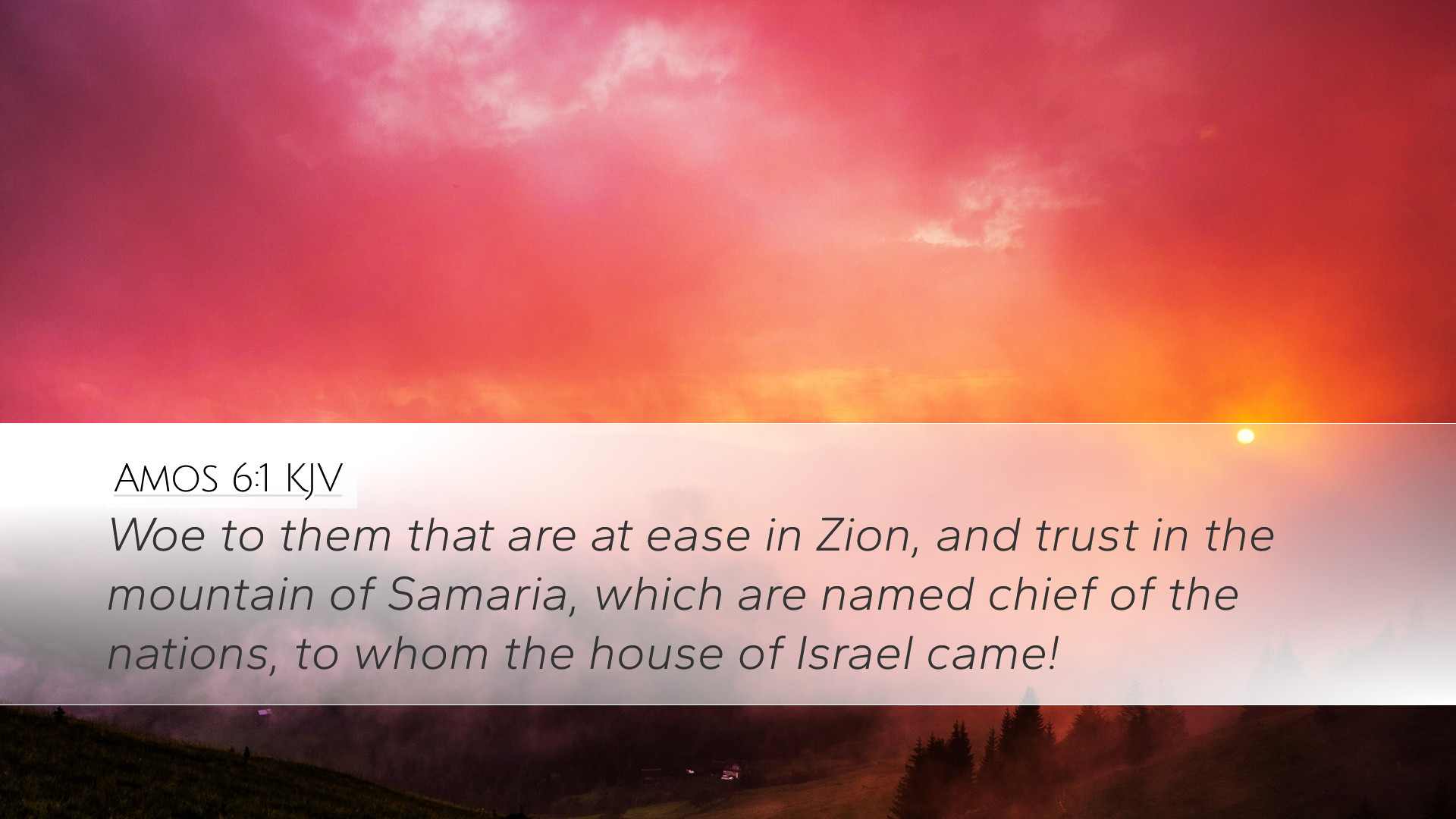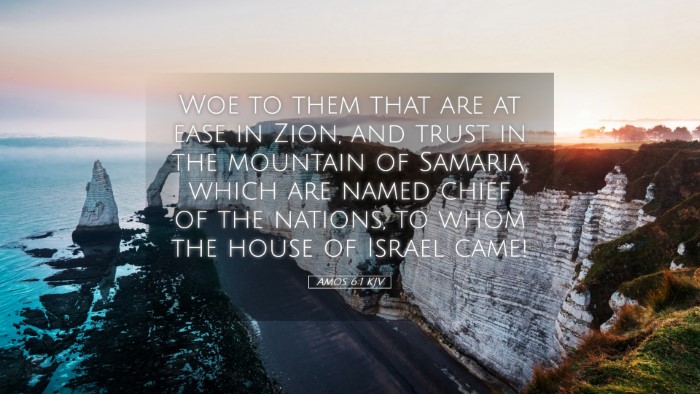Old Testament
Genesis Exodus Leviticus Numbers Deuteronomy Joshua Judges Ruth 1 Samuel 2 Samuel 1 Kings 2 Kings 1 Chronicles 2 Chronicles Ezra Nehemiah Esther Job Psalms Proverbs Ecclesiastes Song of Solomon Isaiah Jeremiah Lamentations Ezekiel Daniel Hosea Joel Amos Obadiah Jonah Micah Nahum Habakkuk Zephaniah Haggai Zechariah MalachiAmos 6:1
Amos 6:1 KJV
Woe to them that are at ease in Zion, and trust in the mountain of Samaria, which are named chief of the nations, to whom the house of Israel came!
Amos 6:1 Bible Commentary
Commentary on Amos 6:1
Amos 6:1 states: "Woe to those who are at ease in Zion, and to those who feel secure on the mountain of Samaria, the notable men of the foremost nations, to whom the house of Israel comes!" This verse serves as a stark warning to the complacent elite of Israel, highlighting themes of security, pride, and impending judgment.
Contextual Background
Amos, a shepherd and fig grower from Judah, spoke out against the injustices and moral decay in the Northern Kingdom of Israel during a time of relative peace and prosperity (ca. 786-746 BCE). The prosperous elite had become indifferent to the suffering of the poor and the plight of their community. Amos's message challenges the social and political status quo, emphasizing that divine judgment is imminent.
Verse Analysis
The phrase "Woe to those who are at ease in Zion" signifies a state of complacency resulting from wealth and status. As Matthew Henry expounds, this ease represents a false sense of security that distances the people from their spiritual responsibilities. The term "Zion" suggests not just geographical Jerusalem but also represents the spiritual center of Israel, reflecting God’s chosen people who have strayed from divine expectations.
Albert Barnes suggests that the woe pronounced here focuses on those who “trust in their power and prosperity,” highlighting a misguided reliance on material wealth rather than on God. The comfort and ease experienced by the prominent leaders paradoxically lead them to neglect the righteousness that God demands.
Reflections on Security and Complacency
Amos addresses those who “feel secure on the mountain of Samaria,” a metaphor illustrating a sense of invulnerability. Adam Clarke comments on this metaphor, saying that while the mountain may symbolize strength and might, it instead serves as a false barrier against the coming judgment. The assured leaders of Samaria mistakenly believe their position will protect them from calamity, underestimating God’s displeasure against their iniquities.
Complacency in Spiritual Life
The cautionary tone of this passage reverberates with timeless relevance. Matthew Henry warns that a lack of spiritual vigilance can lead to devastating consequences: "There is a Caleb spirit in the Lord's servants which never yields to slumber and seeks to keep watch over spiritual feasts.” Hence, excessive comfort can lead to spiritual neglect, illustrating a dire need for vigilance among God’s people.
Social Justice Implications
In the context of Amos’s prophetic ministry, the complacency of the wealthy is contrasted against the poverty and suffering of the lower classes. Amos 6:1 serves as a reminder that divine judgment often arises from social injustices. Albert Barnes emphasizes the need for leaders to protect the vulnerable and champions righteousness as a hallmark of true leadership. The elite’s disregard for justice ultimately invites God’s prophetic warning against their excesses.
Application for Modern Readers
For contemporary pastors and theologians, this verse serves as a compelling call to reflect on the state of their congregations. Are they alert to the signs of spiritual complacency within their communities? Amos 6:1 compels church leaders to actively engage with social issues and to prioritize justice, not just within the church but also within society at large.
Encouragement for Vigilance
Just as Amos issued a prophetic warning, so too should modern believers be reminded to remain vigilant, avoiding complacency in faith. Matthew Henry encapsulates this idea by stating, “Let us not be at ease, but rather call upon the Lord, viewing every advantage of grace as a privilege to serve Him more fully.” The comfort of faith should not breed spiritual lethargy but instead ignite a dynamic pursuit of holiness and justice.
Conclusion
In conclusion, Amos 6:1 echoes the timeless warning against complacency and the reliance on false securities. It invites pastors and students of the Word alike to engage deeply with the text and consider its implications for personal faith, community engagement, and social justice. By addressing these themes, we can build a more robust ecclesiology that reflects God’s heart for the vulnerable and a zealous pursuit of righteousness in all aspects of life.


